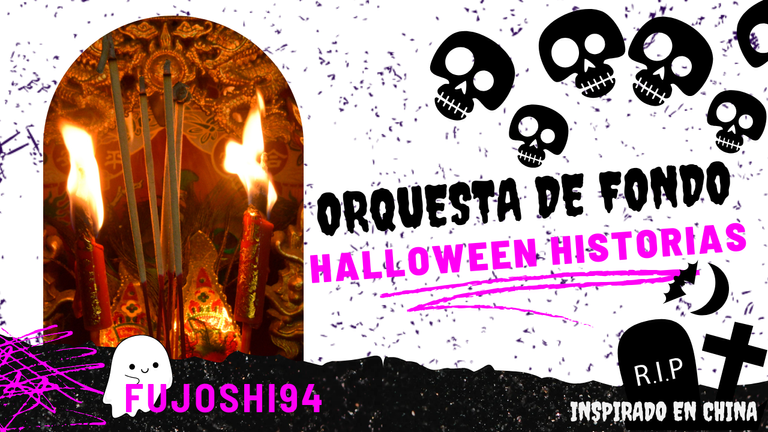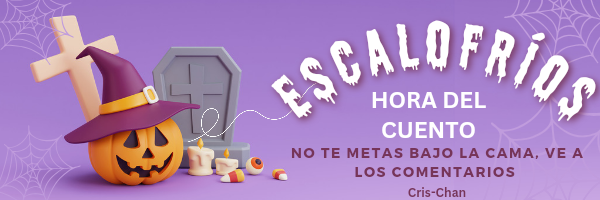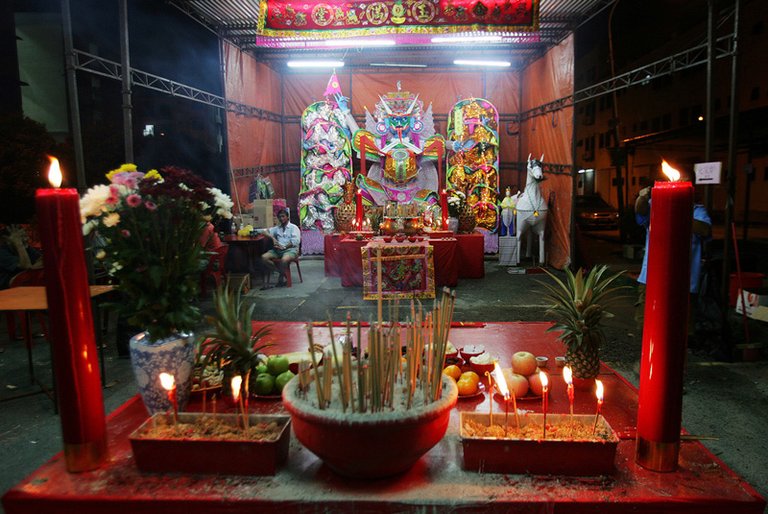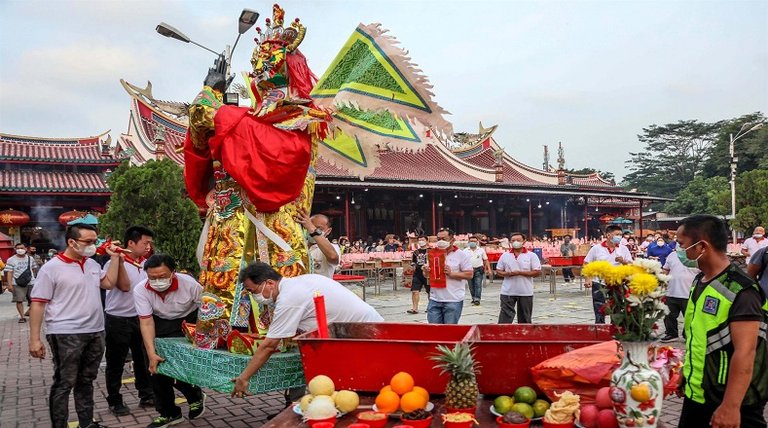
Portada creada en Canva con recursos gratuitos.
Español
Hola, espectros. Bienvenidos a este nuevo post terrorífico. Ya casi se termina octubre y las historias de este trend. Esta comunidad me ha brindado un hogar entre sus almas condenadas para compartir mi visión de las historias que pensé que no tenían cabida en Hive, pero yo les agradezco infinitamente a @zonadeescalofrios.
¿Sabías que en China también se celebra una fiesta parecida al Halloween? Se llama el Festival de los Fantasmas Hambrientos y tiene lugar el día 15 del séptimo mes lunar, que suele caer entre agosto y septiembre. En este día, se cree que los espíritus de los muertos salen del inframundo y vagan por el mundo de los vivos, buscando comida y diversión.
Para apaciguar a estos fantasmas hambrientos, los chinos les ofrecen comida, bebida, incienso y dinero de papel. También queman papel maché con forma de casas, coches, ropa y otros objetos que los difuntos puedan necesitar en el más allá. Algunas personas también organizan espectáculos de ópera y música para entretener a los espíritus, dejando las primeras filas de asientos vacías para ellos.
Pero no todo es fiesta y alegría. El Festival de los Fantasmas Hambrientos también es una ocasión para recordar a los antepasados y honrar su memoria. Los chinos visitan las tumbas de sus familiares, limpian las lápidas, colocan flores y rezan por el bienestar de sus almas. También se abstienen de hacer ciertas cosas que puedan ofender o atraer a los fantasmas, como nadar, viajar, casarse o mudarse de casa.
Se que no es el Halloween al que estamos acostumbrados, pero no es una fiesta tradicional en China. La mayoría de la población no reconoce el día festivo estadounidense. Sin embargo, hay algunas personas que lo celebran, como los turistas y los estudiantes extranjeros que asisten a universidades en China. También hay algunos bares y restaurantes orientados a los expatriados que decoran y organizan fiestas de disfraces en ciudades como Beijing, Shanghai y Guangzhou. Pero no es una costumbre generalizada ni tiene el mismo significado que en Occidente. Los chinos tienen sus propios días de los muertos.
Si hasta aquí han llegado
Les presento mi historia
De tradiciones y gloria
Que no deben olvidar.
No se pueden escapar
De la responsabilidad
Ni de la realidad
Que les toca enfrentar.
Y si quieren nadar
Esperen una hora
Que el agua está mejor
Y no les hará mal.

Orquesta en el fondo
Lucía y Carlos eran dos estudiantes españoles que habían viajado a China para hacer un intercambio cultural. Estaban alojados en una casa de una familia china, que les había acogido con mucha hospitalidad y les había enseñado muchas cosas sobre su cultura.
Un día, les dijeron que se prepararan para celebrar el Festival de los Fantasmas Hambrientos, una fiesta parecida al Halloween, en la que los espíritus de los muertos salían del inframundo y vagaban por el mundo de los vivos, buscando comida y diversión.
Lucía y Carlos se mostraron muy interesados y curiosos por conocer esta tradición. Les parecía fascinante ver cómo los chinos les ofrecían comida, bebida, incienso y dinero de papel a los fantasmas, y cómo quemaban papel maché con forma de casas, coches, ropa y otros objetos que los difuntos pudieran necesitar en el más allá. También les llamó la atención ver cómo organizaban espectáculos de ópera y música para entretener a los espíritus, dejando las primeras filas de asientos vacías para ellos.
Pero lo que más les intrigó fue cuando les dijeron que había ciertas cosas que debían evitar hacer ese día, como nadar, viajar, casarse o mudarse de casa. Les explicaron que esas cosas podían ofender o atraer a los fantasmas, y que era mejor no tentar a la suerte.
Lucía y Carlos se rieron un poco de esas supersticiones. Ellos no creían en fantasmas ni en nada sobrenatural. Pensaron que era una forma de divertirse y de recordar a los antepasados, pero nada más.
Así que cuando se quedaron solos en la casa, decidieron hacer algo que les habían prohibido: nadar en la piscina. Les apetecía refrescarse un poco y pasar un buen rato juntos. Se pusieron sus trajes de baño y se lanzaron al agua sin pensarlo dos veces.
Al principio, todo fue normal. Se chapotearon, se abrazaron, se besaron y se rieron. Pero pronto empezaron a notar algo extraño. El agua se volvió más fría y más oscura. Unas burbujas salieron de la profundidad y rodearon sus cuerpos. Unas manos invisibles les agarraron las piernas y les tiraron hacia abajo.
Lucía y Carlos se asustaron mucho y trataron de soltarse y salir a la superficie. Pero era inútil. Las manos eran muy fuertes y no les dejaban escapar. Se miraron a los ojos con terror y se dieron cuenta de que habían cometido un grave error.
Entonces oyeron una voz que les habló desde el fondo de la piscina:
–Bienvenidos al Festival de los Fantasmas Hambrientos. Somos los espíritus de los ahogados que han muerto en esta piscina. Estamos muy hambrientos y sedientos de sangre. Gracias por ofrecernos vuestros cuerpos como alimento. Esperamos que disfrutéis del espectáculo.
Y acto seguido, las manos les arrancaron la piel, los músculos, los órganos y los huesos, mientras una ópera sonaba en el aire.
FIN

Espero que les haya gustado y si algún día estás en China durante el Festival de los Fantasmas Hambrientos, no te asustes si ves a la gente quemando papel o dejando comida en la calle. Es solo su forma de celebrar el Halloween chino. Nos leemos pasado mañana en otro post y nos iremos a Latinoamérica.
English

Cover created in Canva with free resources.
Hello, ghosts. Welcome to this terrifying new post. October is almost over and the stories of this trend. This community has given me a home among their damned souls to share my vision of the stories that I thought had no place in Hive, but I am infinitely grateful to @zonadeescalofrios.
Did you know that a holiday similar to Halloween is also celebrated in China? It is called the Festival of Hungry Ghosts and takes place on the 15th day of the seventh lunar month, which usually falls between August and September. On this day, the spirits of the dead are believed to emerge from the underworld and wander the world of the living, seeking food and entertainment.
To appease these hungry ghosts, the Chinese offer them food, drink, incense and paper money. They also burn paper mache in the shape of houses, cars, clothes and other objects that the deceased may need in the afterlife. Some people also organize opera and music shows to entertain the spirits, leaving the first rows of seats empty for them.
But not everything is party and joy. The Hungry Ghost Festival is also an occasion to remember ancestors and honor their memory. The Chinese visit the graves of their relatives, clean the tombstones, place flowers and pray for the well-being of their souls. They also refrain from doing certain things that might offend or attract ghosts, such as swimming, traveling, getting married, or moving house.
I know it's not the Halloween we're used to, but it's not a traditional holiday in China. The majority of the population does not recognize the American holiday. However, there are some people who celebrate it, such as tourists and foreign students attending universities in China. There are also some expat-oriented bars and restaurants that decorate and host costume parties in cities like Beijing, Shanghai, and Guangzhou. But it is not a widespread custom nor does it have the same meaning as in the West. The Chinese have their own days of the dead.

Altar
If they have come this far
I present to you my story
Of traditions and glory
That they should not forget.
They can't escape
Of responsibility
Not even reality
What they have to face.
And if they want to swim
wait an hour
That the water is better
And it won't hurt them.

Orchestra at the bottom
Lucía and Carlos were two Spanish students who had traveled to China to do a cultural exchange. They were staying in the house of a Chinese family, who had welcomed them with great hospitality and taught them many things about their culture.
One day, they were told to prepare to celebrate the Hungry Ghost Festival, a holiday similar to Halloween, in which the spirits of the dead emerged from the underworld and wandered through the world of the living, looking for food and fun.
Lucía and Carlos were very interested and curious to learn about this tradition. They found it fascinating to see how the Chinese offered food, drink, incense and paper money to ghosts, and how they burned paper mache in the shape of houses, cars, clothes and other objects that the deceased might need in the afterlife. They were also struck by how they organized opera and music shows to entertain the spirits, leaving the first rows of seats empty for them.
But what intrigued them most was when they were told that there were certain things they should avoid doing that day, such as swimming, traveling, getting married, or moving house. They explained that these things could offend or attract ghosts, and that it was better not to tempt fate.
Lucía and Carlos laughed a little at those superstitions. They didn't believe in ghosts or anything supernatural. They thought it was a way to have fun and remember their ancestors, but nothing more.
So when they were left alone in the house, they decided to do something they had been forbidden to do: swim in the pool. They wanted to cool off a little and have a good time together. They put on their swimsuits and jumped into the water without thinking twice.
At first, everything was normal. They splashed, hugged, kissed and laughed. But soon they began to notice something strange. The water became colder and darker. Bubbles came out of the depths and surrounded their bodies. Invisible hands grabbed their legs and pulled them down.
Lucía and Carlos were very scared and tried to break free and come to the surface. But it was useless. The hands were very strong and did not let them escape. They looked into each other's eyes in terror and realized that they had made a serious mistake.
Then they heard a voice that spoke to them from the bottom of the pool:
—Welcome to the Hungry Ghost Festival. We are the spirits of the drowned who have died in this pool. We are very hungry and thirsty for blood. Thank you for offering us your bodies as food. We hope you enjoy the show.
And immediately afterwards, the hands tore off their skin, muscles, organs and bones, while an opera played in the air.
END

I hope you liked it and if one day you are in China during the Hungry Ghost Festival, don't be scared if you see people burning paper or leaving food on the street. It's just their way of celebrating Chinese Halloween. We'll see you the day after tomorrow in another post and we'll go to Latin America.

Creo que los espíritus son susceptibles en esa fecha jaja ¿Cómo que no puedo nadar? ¿Si nado me ahogan? jjajaja que meioo
Que final mas turbio dios, me imagine todo. Ok entendido.. me intriga saber que pasaría con los que se casan. Me gusta que cuentes una tradición y luego armes una historia. Es una buena estrategia para tener un aprendizaje significativo. Jamás me olvidare de que no debo nada en el Halloween chino jaja saludos.
Me gusta mucho este estilo, pues todos aprendemos algo. Yo tampoco lo sabía y ahora tengo ganas de quemar papel para que no me pase nada malo.
Los espíritus son susceptibles cuando son tradiciones así. Supongo que es su único momento para estar en la tierra con sus seres queridos.
Gracias por leer y espero que puedas disfrutar el otro. Será un poco más local 😄
Yay! 🤗
Your content has been boosted with Ecency Points
Use Ecency daily to boost your growth on platform!
Support Ecency
Vote for new Proposal
Delegate HP and earn more, by @felipao-wrla.
Lo que hiciste con tu post es un recurso súper importante en literatura: investigación cultural. En ocasiones nos llama la atención sucesos, festividades y más, pero para ello debemos saber dónde estamos parados en el plano cultural.
Pese a que no lo entendemos, las tradiciones tienen razones de ser y aunque tengamos incredulidad, hay que mantener el respeto al 100, de lo contrario la experiencia puede ser fatídica como la que nos contaste 😈
Cuando empecé esta serie de historias para Halloween hice una investigación de su origen y me gustó.
Eran cosas que no sabía o ignoraba que habían nacido de eso, así que decidí contar mis historias basadas en otras culturas, pero pensé en que nadie entendería sino le daba contexto primero. Además todos deberíamos aprender al menso 5 cosas nuevas todos los días!!
Es un ganar ganar!! Y yo siempre digo que aunque no creas en eso debes respetar las tradiciones y culturas de los demás. Es fundamental y habla bien de tu empatia como ser humano.
Mañana hablaré de una más cercana y creo que Culturalmente más conocida. Espero leerte en ese también ❤️
Excelente 🤗
Good
Gracias ☺️ puedes leer otros en mi perfil
Bienvenida al Averno de Hive
Hemos leído tu publicación y queremos hacerte la siguiente recomendación:
Sin más que agregar, nos leemos en un próximo post.
Muchas gracias por la recomendación. Estaré atenta para que el próximo post sea mucho mejor.
No serían en todo caso citas textuales porque yo leo, interpretó y con esa información hago el post.
Pondré en todo caso de dónde leo está información. Gracias por la recomendación ❤️